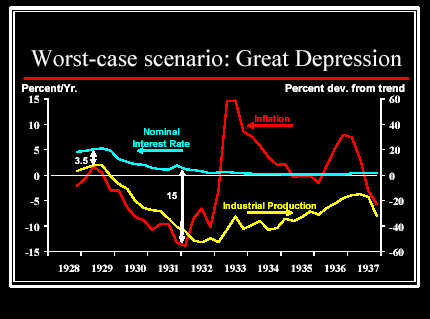Re: Runnin' Scared...
JK, Fred,
Your comments are absolutely correct in the FASB accounting sense.
However, you miss one important point: some level of deposits are required in order to generate the FASB assets - loans.
When times are good - specifically when reserve requirements are going down and or loan defaults are falling, then deposits are bad since they reduce theoretical maximum profitability (percentage).
However, when times are bad - i.e. when either reserve requirements are going up or bad loans are going up, then deposits are valuable since they preserve profitability (and survival).
This is what I mean when net deposits are negative: it is not that the deposits are not there, it is that the actual reserve position of many banks is very possibly negative when bad loans are taken into account because the losses on these loans detract from the bank's reserves.
The value of these banks then is affected by this reserve position. When the reserves go too low, then recapitalization must occur or the bank fails. We're seeing the recaps going on now, the failures will not be long in coming.
In fact, what might start happening is a large bank buying a very conservative smaller bank so that the overall reserve ratio is improved (for the acquirer). This assumes there are any such entities left.
After all, what is the intrinsic value of a bank violating reserve requirements? And with monstrous bad loan portfolios?
Originally posted by jk
Originally posted by Fred
Your comments are absolutely correct in the FASB accounting sense.
However, you miss one important point: some level of deposits are required in order to generate the FASB assets - loans.
When times are good - specifically when reserve requirements are going down and or loan defaults are falling, then deposits are bad since they reduce theoretical maximum profitability (percentage).
However, when times are bad - i.e. when either reserve requirements are going up or bad loans are going up, then deposits are valuable since they preserve profitability (and survival).
This is what I mean when net deposits are negative: it is not that the deposits are not there, it is that the actual reserve position of many banks is very possibly negative when bad loans are taken into account because the losses on these loans detract from the bank's reserves.
The value of these banks then is affected by this reserve position. When the reserves go too low, then recapitalization must occur or the bank fails. We're seeing the recaps going on now, the failures will not be long in coming.
In fact, what might start happening is a large bank buying a very conservative smaller bank so that the overall reserve ratio is improved (for the acquirer). This assumes there are any such entities left.
After all, what is the intrinsic value of a bank violating reserve requirements? And with monstrous bad loan portfolios?

 Watch
Watch
Comment